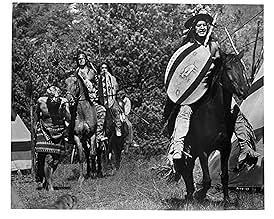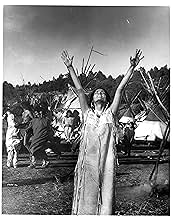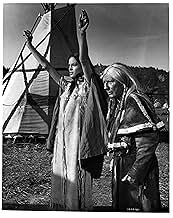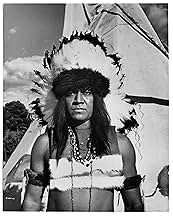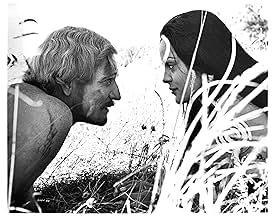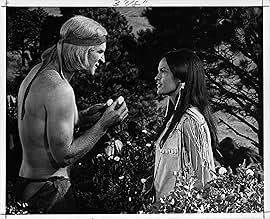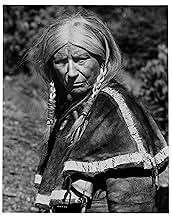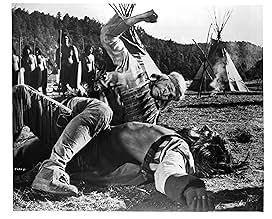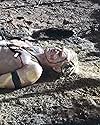In 1825, an English aristocrat is captured by Native Americans. He lives with them and begins to understand their way of life. Eventually, he is accepted as part of the tribe and aspires to ... Read allIn 1825, an English aristocrat is captured by Native Americans. He lives with them and begins to understand their way of life. Eventually, he is accepted as part of the tribe and aspires to become their leader.In 1825, an English aristocrat is captured by Native Americans. He lives with them and begins to understand their way of life. Eventually, he is accepted as part of the tribe and aspires to become their leader.
- Director
- Writers
- Stars
- Awards
- 1 win & 2 nominations total
Judith Anderson
- Buffalo Cow Head
- (as Dame Judith Anderson)
Lina Marín
- Thorn Rose
- (as Lina Marin)
- Director
- Writers
- All cast & crew
- Production, box office & more at IMDbPro
6.810K
1
2
3
4
5
6
7
8
9
10
Featured reviews
Interesting Take on Sioux Life
This movie offered a different perspective of the Sioux, and although controversial, it is worth a view. Director Elliot Silverstein doesn't glamorize the Indians and he doesn't make them victims of white injustice. He just tells it like it is, and I have to admire him for it. Many activists protested what they believed to be inaccuracies; nonetheless, the film is the other side of "Dances With Wolves" (really, it's more like "Run of the Arrow"). For an in-depth interview with Silverstein and the making of "A Man Called Horse," read "Making the White Man's Indian: Native Americns and Hollywood Movies." It's a great behind-the-scenes read of this and other popular Western pictures.
authentic portrayal of the Sioux Indians of the time
at the beginning of this movie,there is a blurb about how the events portrayed are taken directly from historical documents of the period.the South Dakota Sioux Indians also had a lot of input into the movie.so,we can assume it is fairly accurate.one thing it does is show the Native American Indians as being just like any other people.this movie took awhile to get going,in my mind,but once it does,it's action packed,and it's very well acted.Richard Harris is the title character.he is a British Lord who is captured by the Sioux in the mid 1800's.first he is treated with disdain,as nothing more than a servant to the aging mother of the chief.gradually,though,things change,though,and he becomes much more.this is a very touching and heart breaking movie.it's also very thought provoking.overall,i give A Man Called Horse a 6/10
Among the Sioux
One of the first films to ever deal with the relationship between white men and Native Americans that wasn't slanted towards the white man, A MAN CALLED HORSE was released during the same year as the excellent Arthur Penn film LITTLE BIG MAN and the ultra-violent SOLDIER BLUE, which also dealt with the white man/Indian conflict. Richard Harris gives a great performance as an Englishman who loses his wagon team to, and is captured by, a group of Sioux Indians in the Dakota territory of the mid-1800s. He soon learns their ways of living, which primitive as they might be to us and to him are very traditional. Though the film is rated 'PG', be forewarned that there are scenes of violence and bloodshed (particularly the Sun Vow sequence) that could have gotten this film an 'R' (or a 'PG-13'), so the film is not exactly for kids. Nevertheless, it is worth seeing.
Strange views
I have to laugh sometimes when I read otherwise sane comments from amateur reviewers. This film has fairly awkward productions values compared to the present, also many of the actors playing native people are very much NOT native. That aside, this is a BREAKTHROUGH movie for Hollywood circa 1970. This movie is not similiar to Dances With Wolves-it's effectively the other way around. I find it strange so many people make that comment. This movie predates the other by more than THIRTY YEARS!!! Anyway ackward production values aside the presentation of the Lakota is far from the touchy feely view Costner presented,we see the brutal side of their way of doing things also, which is as factual as what we see today just not very PC. This is a great period classic,well worth watching.
2nd Time Around
Although this film appeared to be a western for the 1970's, the story was not new. The writer, Dorothy M. Johnson, originally wrote it for the T.V. series Wagon Train (1957-65). Ralph Meeker was cast then in the Richard Harris role, and an excellent job he made of it, in his quiet way. A good story will always stand the test of time, as this proves.
Did you know
- TriviaThe story is based on the experience of Cabeza de Vaca, a Spanish soldier captured by indigenous Americans in 1528.
- GoofsThroughout the film the actress playing Running Deer can be seen with medium long, nicely manicured fingernails.
- Alternate versionsOld German VHS version includes many alternate/more violent takes that are not on the US DVD (whereas the version on the DVD is the same as in the US), especially the ending is almost completely recut. On the other hand the US version includes a few lines which are not in the German version.
- ConnectionsEdited into EBN: Commercial Entertainment Product (1992)
Details
- Release date
- Countries of origin
- Languages
- Also known as
- Un hombre llamado Caballo
- Filming locations
- Production companies
- See more company credits at IMDbPro
Box office
- Gross US & Canada
- $1,941,247
- Gross worldwide
- $44,000,000
- Runtime
- 1h 54m(114 min)
- Sound mix
- Aspect ratio
- 2.35 : 1
Contribute to this page
Suggest an edit or add missing content


